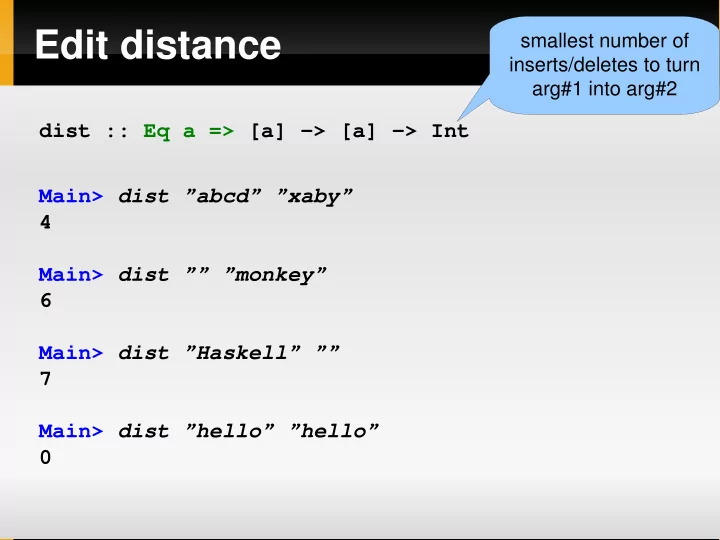

Edit distance smallest number of inserts/deletes to turn arg#1 into arg#2 dist :: Eq a => [a] -> [a] -> Int Main> dist ”abcd” ”xaby” 4 Main> dist ”” ”monkey” 6 Main> dist ”Haskell” ”” 7 Main> dist ”hello” ”hello” 0
Edit distance implementation dist :: Eq a => [a] -> [a] -> Int challenge #0: dist [] ys = length ys implement a polynomial dist xs [] = length xs time version dist (x:xs) (y:ys) | x == y = dist xs ys | otherwise = (1 + dist (x:xs) ys) `min` (1 + dist xs (y:ys)) either insert y or two recursive calls: delete x exponential time
How to test? -- ”Test Oracle” think Formal specification QuickCheck Executable Efficient (polynomial time) comparing against naive dist is no good... challenge #1: find an practical way to test your implementation!
(answer)
An efficient dist dynamic programming dist :: Eq a => [a] -> [a] -> Int dist xs ys = head (dists xs ys) dists :: Eq a => [a] -> [a] -> [Int] dists [] ys = [n,n-1..0] where n = length ys dists (x:xs) ys = line x ys (dists xs ys) line :: Eq a => a -> [a] -> [Int] -> [Int] line x [] [d] = [d+1] line x (y:ys) (d:ds) | x == y = head ds : ds' | otherwise = (1+(d`min`head ds')) : ds' testing where upper-bound: easy, ds' = line x ys ds lower-bound: hard
Naive dist dist :: Eq a => [a] -> [a] -> Int base case #1 dist [] ys = length ys dist xs [] = length xs base case #2 dist (x:xs) (y:ys) | x == y = dist xs ys step case #1 dist (x:xs) (y:ys) | otherwise = (1 + dist (x:xs) ys) `min` (1 + dist xs (y:ys)) step case #2
”Inductive Testing” prop_BaseXs (ys :: String) = dist [] ys == length ys prop_BaseYs (xs :: String) = dist xs [] == length xs prop_StepSame x xs (ys :: String) = specialization dist (x:xs) (x:ys) == dist xs ys prop_StepDiff x y xs (ys :: String) = x /= y ==> dist (x:xs) (y:ys) == (1 + dist (x:xs) ys) `min` (1 + dist xs (y:ys))
(Alternative) distFix :: Eq a => ([a] -> [a] -> Int) -> ([a] -> [a] -> Int) distFix f [] ys = length ys distFix f xs [] = length xs no recursion distFix f (x:xs) (y:ys) | x == y = f xs ys | otherwise = (1 + f (x:xs) ys) `min` (1 + f xs (y:ys)) prop_Dist xs (ys :: String) = dist xs ys == distFix dist xs ys
What is happening? bugs
Applications Search algorithms SAT-solvers other kinds of solvers Optimization algorithms LP-solvers (edit distance) Symbolic algorithms? substitution, unification, anti-unification, ...
Recommend
More recommend